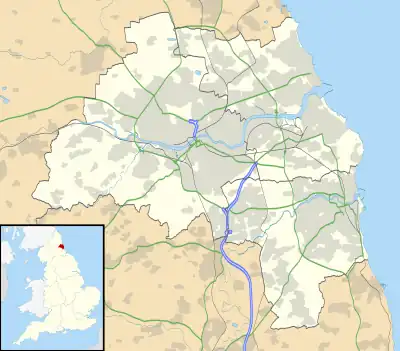Percy Main Metro station
Percy Main is a Tyne and Wear Metro station, serving the suburb of Percy Main, North Tyneside in Tyne and Wear, England. It joined the network on 14 November 1982, following the opening of the fourth phase of the network, between Tynemouth and St James via Wallsend.
Percy Main | |||||||||||
|---|---|---|---|---|---|---|---|---|---|---|---|
| Tyne and Wear Metro station | |||||||||||
 | |||||||||||
| General information | |||||||||||
| Location | Percy Main, North Tyneside England | ||||||||||
| Coordinates | 54°59′58″N 1°28′29″W | ||||||||||
| Grid reference | NZ336673 | ||||||||||
| Transit authority | Tyne and Wear PTE | ||||||||||
| Platforms | 2 | ||||||||||
| Tracks | 2 | ||||||||||
| Construction | |||||||||||
| Bicycle facilities | 3 cycle pods | ||||||||||
| Accessible | Step-free access to platform | ||||||||||
| Other information | |||||||||||
| Station code | PCM | ||||||||||
| Fare zone | B | ||||||||||
| History | |||||||||||
| Original company | Newcastle and North Shields Railway | ||||||||||
| Pre-grouping | North Eastern Railway | ||||||||||
| Post-grouping | |||||||||||
| Key dates | |||||||||||
| 22 June 1839 | Opened | ||||||||||
| 11 August 1980 | Closed for conversion | ||||||||||
| 14 November 1982 | Reopened | ||||||||||
| Passengers | |||||||||||
| 2017/18 | 0.20 million[1] | ||||||||||
| Services | |||||||||||
| |||||||||||
| Location | |||||||||||
 Percy Main Location in Tyne and Wear, England | |||||||||||
History
The station is on the site of the former Percy Main station, which was opened on 22 June 1839, on the Newcastle and North Shields Railway, serving a small riverside community clustered around a colliery.[2] This later became part of the North Tyneside Loop, served by the North Eastern Railway.
Heading east from the Percy Main, towards Whitley Bay, the line crosses the 55° north line of latitude. The station is located to the east of the junction with the former Riverside Branch, which closed to passengers in July 1973, with goods services continuing in to the late 1980s.[3]
Following closure for conversion in the early 1980s, the station was demolished and re-built. The original North Eastern Railway bridge was preserved by the National Railway Museum in York. The preserved footbridge is very similar to the one still in place at South Gosforth.[4]
The station is a short walk from the southern terminus of the North Tyneside Steam Railway, a heritage line which runs through the site used by the Tyne and Wear Metro as a testing facility in the late 1970s.
Facilities
Step-free access is available at all stations across the Tyne and Wear Metro network, with ramps providing step-free access to both platforms at Percy Main. The station is equipped with ticket machines, sheltered waiting area, seating, next train information displays, timetable posters, and an emergency help point on both platforms. Ticket machines are able to accept payment with credit and debit card (including contactless payment), notes and coins.[5][6] The station is also fitted with smartcard validators, which feature at all stations across the network.[7][8]
A small free car park is available, with six spaces, plus two accessible spaces. There is also the provision for cycle parking, with three cycle pods available for use.[9]
Services
As of April 2021, the station is served by up to five trains per hour on weekdays and Saturday, and up to four trains per hour during the evening and on Sunday.[10]
Rolling stock used: Class 599 Metrocar
References
- "Tyne and Wear Metro usage figures 2017–18". Retrieved 21 August 2019.
- "Disused Stations: Percy Main Station". Disused Stations. Retrieved 14 May 2017.
- "Riverside Branch". Northumbrian Railways. Archived from the original on 16 July 2009. Retrieved 25 May 2020.
- "Railway footbridge from Percy Main Colliery station". National Railway Museum. Retrieved 10 February 2007.
- "Metro passengers feel the benefit of contactless payment". Nexus. 13 January 2014. Retrieved 25 May 2020.
- "Revamp for Metro ticket machines". BBC News. 11 December 2011. Retrieved 25 May 2020.
- "City Metro stations get new smart ticket machines and gates". Nexus. 22 October 2012. Retrieved 25 May 2020.
- "Pop card validators at Metro stations are put through their paces". Nexus. 21 March 2013. Retrieved 25 May 2020.
- "Timetables and stations: Percy Main". Nexus. Retrieved 25 May 2020.
- "Timetables and stations: Percy Main". Tyne and Wear Passenger Transport Executive. Retrieved 30 March 2021.
External links
 Media related to Percy Main Metro station at Wikimedia Commons
Media related to Percy Main Metro station at Wikimedia Commons- Timetable and station information for Percy Main